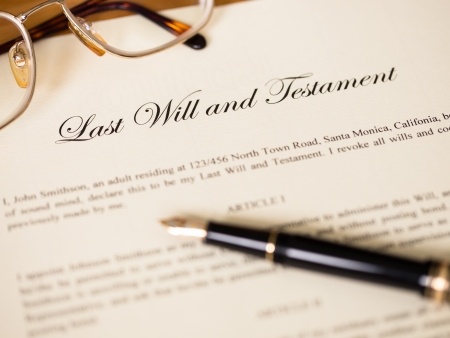
Last Wills and Testaments
are the last people think of when they talk to their families, friends or spouses. Most people find talking about creating what we call an “Estate Plan” is morbid. That couldn’t be farther from the truth. It is a wonderful gift you can give your family and friends. It not on leaves your family knowing your exact wishes, but it also can help them move through the Probate process faster.
When creating your Estate Plan, you will receive three documents which each have different meanings and uses. A Last Will & Testament, Power of Attorney and Advanced Health Care Directive. Below each document will be described.
A Last Will & Testament provides who will be handling your Estate once you have passed and also who will be receiving what assets, the percentages of the disbursement, Guardians and Trustees (if there are minor children) and who may be disinherited.
You will need choose who you would like to be your Executor (Male) or Executrix (Female) to handle your affairs after you pass. Which means who do you feel most comfortable with handling the Probate portion of your Estate. Most married couples use each other, but you could have your parents, siblings, children (if they are over age of 18) or friends. You will also need to choose a back up Executor(rix) who will take the place if the first does not survive you more than thirty days or chooses not to handle the Probate.
If there are minor children, you will need to choose who will be the Guardians. Of course, whether married or not, the minor child will be “willed”, so to speak, to the surviving parent. UNLESS, the surviving parent has given up all parental rights. If there is no other parent, then you may choose whom you feel most comfortable with leaving your children too. You may want to think about who sees your children the most and who they feel comfortable around. You will also need a backup Guardian for them.
The next item is the Trustee for the minor children. Just like the Guardian, this would have to be someone whom you feel most comfortable handling your children’s finances who will make the right financial decisions for your children. They will have complete control over the child finances, which comprise of their education, clothing, activities, etc. You will also need to decide at what age(s) you would like your children to receive their portion of Trust that is left for them. Typically, this is set at ages 25, 30 and 35.
The final item to discuss is who will inherit what. Typically, spouses are the first to inherit all assets in the Estate, then the back-up is the children, other family members or friends. This is based on a person to person basis. This is something that would solely be your decision.
Moving on to the next document, the Power of Attorney. The Power of Attorney allows whom every you choose, again someone you trust, to assist in your finances, real estate, etc., if you become incapacitated. You will need what is called an Agent and a back-up Agent in the event the first Agent does not survive you more than thirty days or declines to assist in this aspect.
The final documentation is the Health Care Directive, also known as the Living Will. This is an extremely important document as when you go into a hospital or healthcare facility they ask if you have a Health Care Directive. Before surgeries, before any procedure, etc., if you do not have a Health Care Directive, they have you sign their form. This form allows you to advise your Successor or back-up Successor, what your wishes are. Some of the decision on this document you will make is whether you want to be left on life support and a feeding tube or to have your organs donated.
The best step to have these documents prepared is talking to an Estate Planning Attorney. They will lay out exactly what you need to get started. They will complete the Estate Plan for your review and contact you to review and finalize all documents. Once you have the Last Will & Testament and Power of Attorney signed, witnessed and Notarized it becomes a legal document in the State of Pennsylvania. The Health Care Directive only needs to be signed by you and witnessed. Each document must be witnessed by two individuals who are not named throughout any of the Estate Plan.







